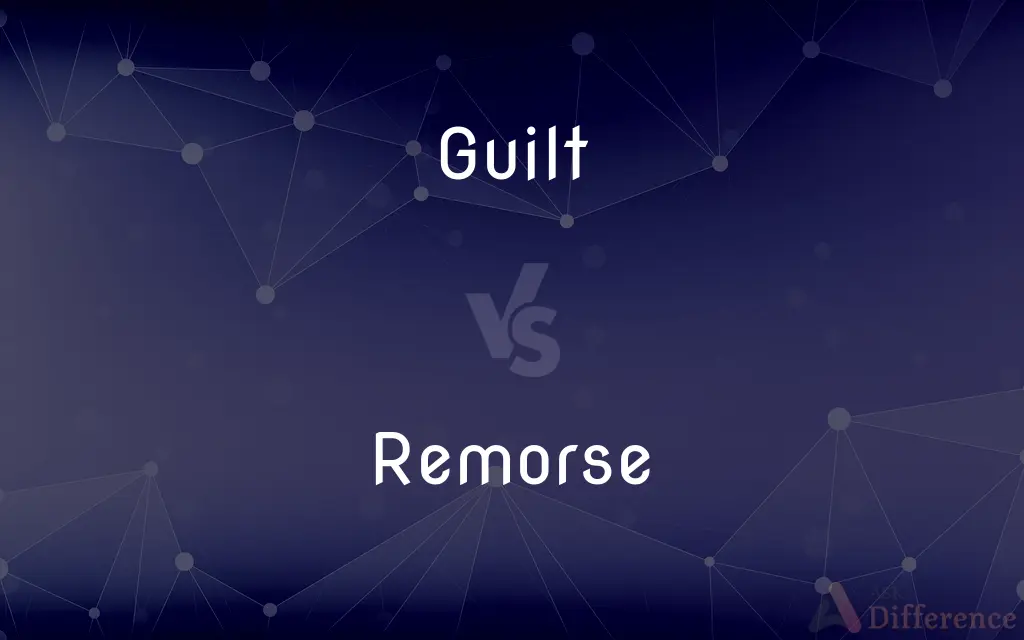Guilt vs. Remorse — What's the Difference?
By Tayyaba Rehman — Updated on September 15, 2023
Guilt is the realization of wrongdoing, while remorse is the deep regret or sadness for that wrongdoing.

Difference Between Guilt and Remorse
Table of Contents
ADVERTISEMENT
Key Differences
Guilt and remorse are emotional responses to actions or thoughts that go against one's moral compass or societal norms. Guilt often surfaces as the recognition or acknowledgment of a wrongdoing or error. Remorse, in contrast, is the subsequent emotion — a deep sorrow or regret for causing harm or discomfort to someone, including oneself.
Guilt is like the mental "flag" that something was amiss. It's an awareness that one has acted inappropriately or unethically. Remorse, on the other hand, involves a deeper introspection, leading one to genuinely wish they hadn't committed the act in the first place.
In a practical sense, someone might feel guilt for telling a lie. This guilt is their recognition that they've gone against their principles. However, when they consider the pain or confusion their lie caused another person, they might then experience remorse.
The two emotions can be felt separately or simultaneously. It's possible to feel guilt about an action without necessarily feeling remorse, indicating an understanding of the error but not necessarily a personal regret. Conversely, feeling remorse almost always implies a preceding sensation of guilt since it emerges from the understanding of one's harmful actions.
Comparison Chart
Definition
Realization of wrongdoing
Deep regret or sadness for wrongdoing
ADVERTISEMENT
Emotional Depth
Surface-level acknowledgment
Deeper introspection and personal regret
Sequence
Often precedes remorse
Follows the realization of guilt
Concern
More about the action itself
Concern for the impact of the action on others
Longevity
Can be fleeting once acknowledged
Tends to linger, prompting reflection and potential amends
Compare with Definitions
Guilt
A feeling of responsibility for a wrong or mistake.
The guilt of forgetting her birthday weighed on him.
Remorse
A gnawing distress arising from a sense of guilt.
She felt deep remorse for hurting his feelings.
Guilt
The fact of having committed a specified or implied offence or crime
It is the duty of the prosecution to prove the prisoner's guilt
Remorse
Emotional anguish from wrongful deeds.
Remorse overwhelmed her after betraying her friend's trust.
Guilt
Make (someone) feel guilty, especially in order to induce them to do something
Celeste had been guilted into going by her parents
Remorse
Sorrow or contrition for past actions or sins.
Remorse kept him awake, thinking of his harsh words.
Guilt
The fact of being responsible for the commission of an offense; moral culpability
The investigation uncovered the suspect's guilt.
Remorse
A painful reflection on one's misdeeds.
His remorse led him to seek forgiveness and make amends.
Guilt
(Law) The fact of having been found to have violated a criminal law; legal culpability
The jury's job is to determine the defendant's guilt or innocence.
Remorse
Remorse is a distressing emotion experienced by an individual who regrets actions which they have done in the past that they deem to be shameful, hurtful, or wrong. Remorse is closely allied to guilt and self-directed resentment.
Guilt
Responsibility for a mistake or error
The guilt for the book's many typos lies with the editor.
Remorse
Deep regret or guilt for a wrong committed
They were filled with remorse and shame
Guilt
A painful emotion experienced when one believes one's actions or thoughts have violated a moral or personal standard
She felt guilt for not having helped the injured animal.
Remorse
Moral anguish arising from repentance for past misdeeds; bitter regret.
Guilt
To make or try to make (someone) feel guilty
My roommate guilted me for forgetting to wash the dishes.
Remorse
(Obsolete) Compassion.
Guilt
To cause (someone) to do something by arousing feelings of guilt
My roommate guilted me into washing the dishes.
Remorse
A feeling of regret or sadness for doing wrong or sinning.
Guilt
Responsibility for wrongdoing.
Remorse
(obsolete) Sorrow; pity; compassion.
Guilt
(law) The state of having been found guilty or admitted guilt in legal proceedings.
Remorse
The anguish, like gnawing pain, excited by a sense of guilt; compunction of conscience for a crime committed, or for the sins of one's past life.
Guilt
The regret of having done wrong.
Remorse
Sympathetic sorrow; pity; compassion.
Curse on the unpardoning prince, whom tears can drawTo no remorse.
But evermore it seem'd an easier thingAt once without remorse to strike her dead.
Guilt
To commit offenses; act criminally.
Remorse
A feeling of deep regret (usually for some misdeed)
Guilt
To cause someone to feel guilt, particularly in order to influence their behaviour.
He didn't want to do it, but his wife guilted him into it.
Remorse
Deep regret or guilt for a wrong committed.
His remorse was evident in his tearful apology.
Guilt
The criminality and consequent exposure to punishment resulting from willful disobedience of law, or from morally wrong action; the state of one who has broken a moral or political law; crime; criminality; offense against right.
Satan had not answer, but stood struckWith guilt of his own sin.
Guilt
Exposure to any legal penalty or forfeiture.
A ship incurs guilt by the violation of a blockade.
Guilt
A feeling of regret or remorse for having committed some improper act; a recognition of one's own responsibility for doing something wrong.
Guilt
The state of having committed an offense
Guilt
Remorse caused by feeling responsible for some offence
Guilt
The awareness of having committed an offense.
He felt guilt after breaking his sister's toy.
Guilt
A state of having done something morally or legally wrong.
The evidence pointed to his guilt in the crime.
Guilt
A conscious feeling of culpability.
Guilt consumed her after she cheated on the test.
Guilt
An emotional state from violating one's own standards.
His guilt was evident in his reluctance to meet her gaze.
Common Curiosities
Is remorse a deeper emotion than guilt?
Generally, yes. Remorse involves deeper introspection and genuine regret for causing harm.
Can one feel guilt without remorse?
Yes, one can recognize a wrong action (guilt) without necessarily feeling deep regret for it (remorse).
What is guilt?
Guilt is the realization or acknowledgment of having done something wrong.
Why do people feel guilt?
People feel guilt when they believe they've violated their own moral code or societal norms.
Can guilt lead to stress or anxiety?
Yes, unresolved or chronic guilt can contribute to stress, anxiety, and even depression.
Is guilt always negative?
Not always. Constructive guilt can motivate positive change and encourage responsibility.
How can one cope with feelings of remorse?
Seeking forgiveness, making amends, reflecting on the action, and learning from mistakes can help cope with remorse.
Can both emotions coexist?
Yes, it's common to first feel guilt for a wrongdoing and then experience remorse upon reflecting on its impact.
How does remorse differ from guilt?
Remorse is the deep regret or sadness felt for a wrongdoing, whereas guilt is the recognition of that wrongdoing.
Is it possible to overcome feelings of guilt?
Yes, by addressing the cause, seeking forgiveness, and taking corrective actions, one can move past guilt.
Can remorse lead to corrective actions?
Yes, often remorse prompts individuals to apologize, make amends, or change their behavior.
How are guilt and remorse connected to morality?
Both emotions arise from violations of personal or societal moral codes, acting as indicators of one's ethical compass.
Can remorse be beneficial?
While painful, remorse can drive self-reflection, growth, and positive behavioral changes.
Are guilt and remorse always tied to major wrongdoings?
No, they can be felt for minor transgressions or even perceived wrongs that aren't objectively harmful.
Does everyone feel guilt and remorse the same way?
No, individual experiences and expressions of guilt and remorse can vary based on culture, upbringing, and personal beliefs.
Share Your Discovery

Previous Comparison
Lot vs. Parcel
Next Comparison
Ciphered vs. CypheredAuthor Spotlight
Written by
Tayyaba RehmanTayyaba Rehman is a distinguished writer, currently serving as a primary contributor to askdifference.com. As a researcher in semantics and etymology, Tayyaba's passion for the complexity of languages and their distinctions has found a perfect home on the platform. Tayyaba delves into the intricacies of language, distinguishing between commonly confused words and phrases, thereby providing clarity for readers worldwide.














































